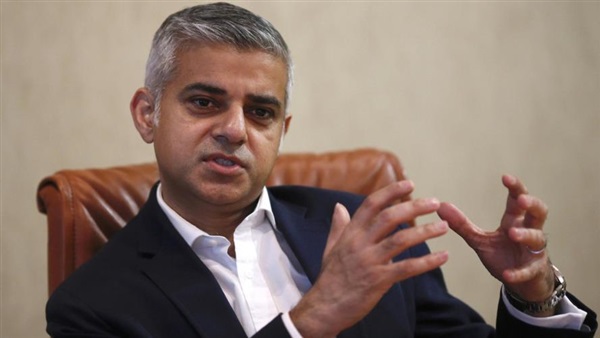Labour leadership: Sadiq Khan backs Starmer, saying he's best person to unite party and defeat Tories

George Eustice, the environment secretary, held a
press conference at the National Farmers’ Union conference in Birmingham where
he was speaking this morning.
As ITV’s Daniel Hewitt reports, Eustice defended the
PM’s decision not to visited areas that have recently visited flooded, even
though he did visit flood victims during the general election campaign last
year.
Eustice said the PM felt he had to get involved last
year because the purdah period in force during the election meant that, without
his intervention, Whitehall was slow to get a grip on the crisis.
Turning back to the budget, here are three
budget-related stories from today’s papers.
Eighteen MPs from the blue collar group of
Conservative MPs caucus - 14 of whom were elected for the first time in 2019 in
north and midlands of England- wrote to the Chancellor Rishi Sunak expressing
“deep concern” the fuel duty freeze will be scrapped.
A small increase would raise an extra £4billion
worth of funding for the Treasury. Fuel duty could rise by up to two pence
which will see overall petrol and diesel costs increase, according to reports.
However in the letter the group says: “We are
writing to express our deep concern following reports that you are considering
scrapping the fuel duty freeze at this year’s Budget.
“If the decision was taken to raise taxes on fuel,
hard-working people and businesses in blue collar communities – many of which lent
us their support at the General Election for the first time in generations -
will suffer.”
Francis Elliott and Steven Swinford in the Times
(paywall) say Rishi Sunak, the chancellor, is expected to cut subsidies for a
type of diesel used by off-road vehicles and machinery instead of ending the
fuel duty freeze. They say:
The chancellor is shifting more of the cost of
meeting climate change targets from consumers to business as he finalises the
budget, say allies. They suggest that he is cooling on ending the ten-year
freeze on fuel duty amid a mounting backlash from Tory MPs.
Instead, he is preparing new environmental taxes,
including heavy restrictions on the use of so-called red diesel.
Matt Dathan in the Sun says Sunak is considering
raising almost £1bn by closing two inheritance tax loopholes. He says:
The Sun understands the chancellor is mulling
closing two tax reliefs rich families use to funnel money through ghost
companies and farmland before they die.
Rich Brits cut down the amount of inheritance tax
they have to pay by setting up a business or buying land, which can be passed
on to their family after death.
Agricultural relief and business property relief can
protect between 50 per cent and 100 per cent of money invested from inheritance
tax.
Ending business relief would raise the Treasury an
estimated £480m a year and stopping agricultural relief would bring in £320m.
Here is Jack Blanchard’s take on Sir Keir Starmer
getting Sadiq Khan’s endorsement from the London Playbook briefing.
It’s a big boost for Starmer’s campaign, though
probably comes as no great surprise to Labour Kremlinologists, given Khan and
Starmer are both London-based lawyers with closely aligned political outlooks,
and actually go back years (Khan used to brief Starmer when he was a human
rights solicitor.) But a public endorsement from Labour’s most powerful elected
politician will nevertheless give further credence to Starmer’s status as the
clear frontrunner.
Kit Malthouse, the minister for the police, has been
giving interviews this morning. Here are three of the lines that emerged.
Malthouse played down reports that his boss, the
home secretary Priti Patel, bullied civil servants. Asked if she was a bully, he
replied:
I haven’t witnessed any of that. To be honest with
you, I’m totally focused on crime. Everybody in the Home Office is focused on
that, rather than on the sort of soap opera, I’m afraid.
He claimed there was no longer a rift between Patel
and Sir Philip Rutnam, the Home Office permanent secretary whom Patel was
reportedly trying to remove. Asked about this, Malthouse said:
[Rutnam] and the home secretary have put out a joint
statement showing, I think, glutinous harmony, as the prime minister would call
it. Hopefully now we can get on with the mission.
Malthouse said it was up to the House of Lords to
decide if Tom Watson, the former Labour deputy leader, was fit to receive a
peerage in the light of the role he played in publicising false claims about
Westminster figures being involved in child abuse. Asked if Watson should go to
the Lords, Malthouse said:
There is a process of the House of Lords now that is
independent that will have a look at whether he should or he shouldn’t, as it
would with all nominees. I don’t really want to interfere with that.
Jeremy Corbyn has reportedly nominated Watson for a
peerage in the forthcoming dissolution honours.
Paul Johnson, the director of the Institute for
Fiscal Studies, is now being interviewed on Sky’s All out Politics about the
IFS budget assessment out today. (See 9.09am.)
He says this could be “a really big moment” for the
British economy. Last year was the first year without a budget since the 1800s.
And previous budgets were minor, because the government did not have a proper
majority. So this will be the first major budget for years, he says.
He makes the IFS point about the government having
to choose between raising taxes, continuing with austerity, or breaking its
rules on borrowing.
He says, outside of infrastructure, the government
did not make many promises on spending in the Conservative manifesto. But
reversing the cuts of the last 10 years would be very expensive, he says. He
says we will see in the budget whether the government is serious about
reversing those cuts.





